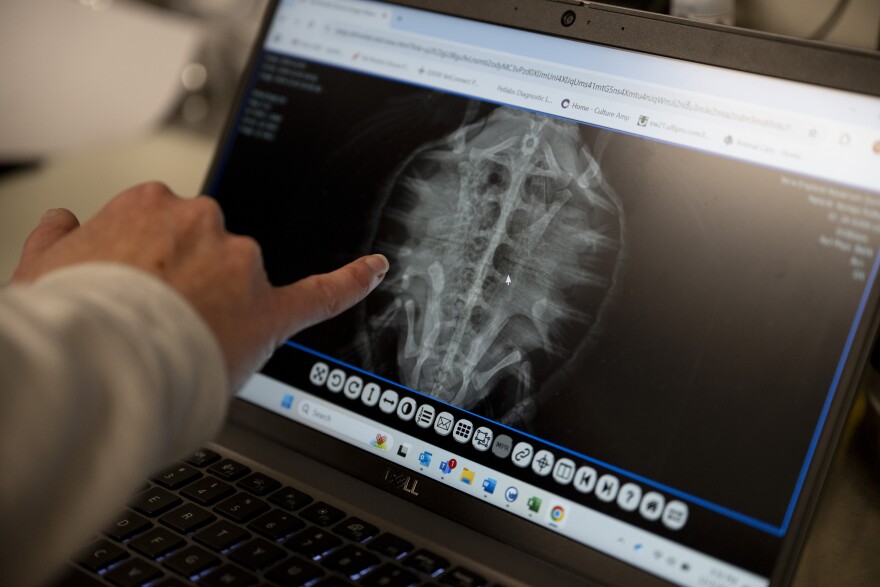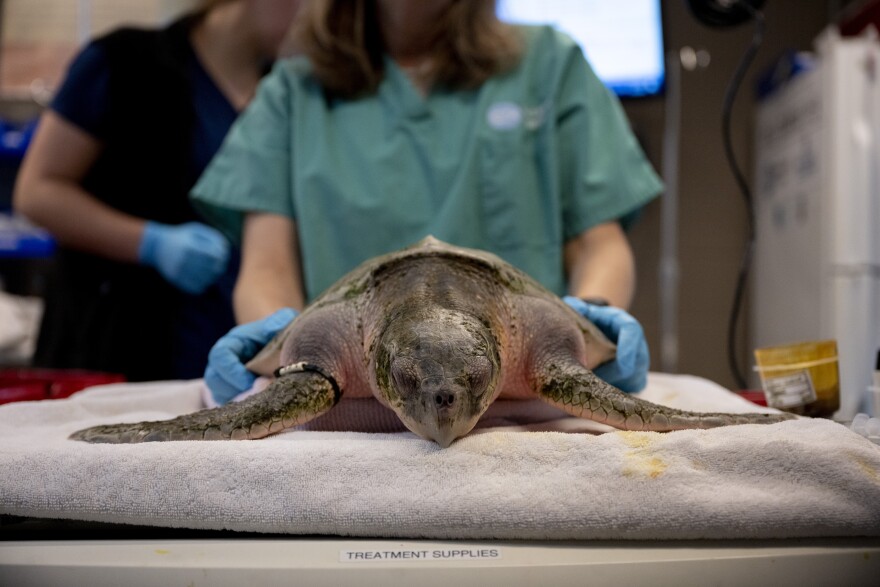A black, dinner-plate-sized turtle lay motionless on an exam table of the New England Aquarium’s sea turtle hospital. Dozens of staff and volunteers buzzed around the facility — a converted warehouse in the seaside city of Quincy — as Adam Kennedy, the hospital’s director, tried to find a signal with a fetal heart monitor.
“This turtle is alive,” Kennedy said. “But we're struggling to get the heart rate on it. That's what we're listening for.”
Kennedy, dressed in green surgical scrubs, gently pushed the handheld monitor into the fleshy neck of the endangered Kemp’s Ridley sea turtle.
“Do you hear that?”
Holding up a speaker connected to the device, Kennedy raised his eyebrows as the subtle whoosh of a heartbeat came through.
“Six beats per minute,” he counted. “That's good. It’s the zeros that are, obviously, more worrisome.”

In the last few days, volunteers have rescued about 300 cold-stunned sea turtles from stranding on Cape Cod beaches. Guided by staff at the Mass Audubon Wellfleet Bay Wildlife Sanctuary, the volunteers packed the turtles into cardboard banana boxes donated by local markets and drove them to the Quincy hospital. This is one of dozens of clinics along the Eastern Seaboard where sea turtles with pneumonia, fractures, and other injuries can get nursed back to health.
“It is tiring, it is stressful, it's really fast-paced,” Melissa Joblon, director of animal health, said between administering turtle x-rays. “But we all want to be here. And it's a really rewarding thing to be able to see a turtle come in who looks almost dead when they arrive and then release them several months later.”

Since the 1970s, the Aquarium’s Sea Turtle hospital has helped rehabilitate more than 5,000 injured sea turtles.
Each fall, as water temperatures drop in the North Atlantic, loggerhead, green, and Kemp’s Ridley sea turtles who have spent their summers in Cape Cod Bay try to begin a southern migration. But, Kennedy said, the Cape Cod peninsula, which juts 40 miles into the ocean and curves up like a flexed arm, acts as a trap.
“Everybody loves sea turtles," Kennedy said. "I've never heard anyone say anything bad about a sea turtle."
“They just want to head south,” he said. “But ultimately, they end up just getting so cold. They just start floating at the surface. They're very debilitated. And then it's the winds that actually push them in.”
In the early 2000s, the hospital was treating about 40 sea turtle patients per year, Kennedy said. But if current trends continue, it could reach 1,000 admits by the end of 2024 — and consistently well over that number by 2030.

Experts attribute the increase to climate change. Historically, sea turtles generally haven’t ventured north of Massachusetts, because the Gulf of Maine has been too cold. But now it’s one of the fastest-warming bodies of water in the world
“With the warming of the Gulf of Maine, that kind of push north is here longer,” Kennedy said. “So it allows more turtles to funnel into Cape Cod Bay.”
Across the hospital, staff are assigned their roles: starting fluids, administering x-rays or developing treatment plans. Biologist Kat DeStefano works in the clinic, taking blood samples from her hard-shelled patients.
“I often want to tell them that what we're doing with them is going to make them feel better, and help them understand,” she said. “It's hard to see them under stress.”

Staffers expect about 80 percent of the turtles to survive their strandings, but few of them will finish their recovery at the New England Aquarium’s facility. Most will be loaded onto planes and flown to other sea turtle hospitals farther south.
Only about 70 of the most critically injured will stay in Quincy to get individualized care — and their own names. The volunteers voted on the naming theme: each turtle will be named after a Greek God.
“Everybody loves sea turtles,” Kennedy said. “I've never heard anyone say anything bad about a sea turtle. You know, you think about all these cultures that look at turtles as carrying the world on their shell. They're just majestic animals and we need to make sure that they continue to survive, that our future generations can appreciate that, and that they aren't wiped out from this planet. So that's why we're doing what we're doing here and making sure that all these turtles hopefully end up back in the ocean.”
Staffers plan to release the survivors back onto Cape Cod beaches next summer.
“We're always asked at releases, like, ‘Are you sad?’” Kennedy said. “I'm like, ‘No, this is why we do it.’ Yeah. It's a little bittersweet. But it's actually a happy moment.”

—
Correction: The name of the New England Aquarium's director of animal health is Melissa Joblon, not Joblin. This error has been corrected in this story.








